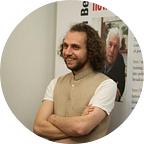Clarity for Teachers: Day 10
‘If you devote yourself wholeheartedly to being clear, you will feel the benefits immediately.’
When I pulled out the card and saw today’s advice, it made me laugh. At first pass, it sounds just like a line from one of those adverts you used to see on the bottom right-hand corner of the cover of a British broadsheet newspaper, selling self-improvement by correspondence: Develop the self-confidence you always wished you had! Improve your memory with our easy-to-learn technique! Learn to write well and get paid for your writing!
The last of these hooked me in when I was twelve: I sent off for further information and a pack of bumf came in the post, with follow-up leaflets and letters arriving every fortnight for the next six months, offering progressively cheaper variants on the original programme. Thirty years later, it occurs to me, I’m finally finding my own route to the goal they promised, though I’m not sure I’d have got there any quicker if I’d paid up and taken the correspondence course.
So I start out playing with that reading of the card, and then I wonder what else these words could mean — what they could tell us about the nature of this work of being clear.
The first thing is the weight of the words at the front of the sentence. To devote yourself wholeheartedly is not a light undertaking, it’s the opposite of a free trial. I remember talking with Martin Shaw about how easily the offer of teaching deep things can get caught in the web of consumerism, another lifestyle choice, identity marker or leisure activity. His answer was that with the wilderness rites of passage work he leads — which culminates in a four-day solo fast, alone on a hillside with only a bottle of water and a tarp — ‘the price of entry is to be consumed.’
Something like this is at stake here. There is nothing safe about devoting yourself wholeheartedly: no part of you can remain a detached observer. You’re all in, now.
Another memory — interviewing Rowan Williams, in my last term at journalism school, just before he became Archbishop of Canterbury. ‘Sooner or later,’ he says, ‘I think that most of us arrive at the question: what would I stake my life on?’ What matters to me more than my own desire for survival?
There’s an echo of that in this condition of wholehearted devotion. And then there’s the organ that’s invoked. I love the virtues which have heart in them: wholeheartedness, courage… Are there more, I wonder, in English or in other languages?
Now turn to the other end of the sentence — and read it like a riddle. What kind of thing can you learn, where you will feel the benefits immediately? That’s not how it works with learning the violin. (‘She didn’t want to learn the violin, she wanted to play the violin,’ I remember a mother saying about her daughter’s struggle with music practice.) It’s not how it works with running — I let it drop and get out of shape, and then when I pick it up again, the first couple of weeks are horrible, until my body starts to feel the benefits.
I’d say that anything where you feel the benefits immediately is not a case of acquiring something you didn’t have, or building up an underdeveloped capacity, but releasing something you had all along.
When I’ve been involved in bringing projects and organisations into being, the best work has felt that way — it’s not a matter of bringing in special resources from outside the context where we’re working, but of holding external pressures at bay for long enough that people can relax and remember how to be human together. There’s a mantra I use when talking about this work: ‘People are good at being people, we’ve been doing it for a long time.’
Much of what makes things complicated is stuff that we haven’t been doing for very long: processes shaped by the requirements of institutional, bureaucratic or technological systems, rather than human needs, and ways of seeing the world and treating each other arising from this. The more we can ground our work and meet each other in human ways of being — interacting with those larger systems where needed, but creating pockets in which they do not dominate — the more the deep currents we are carrying can come to the surface.
It might sound grand or far-fetched when I spell it out like that, but it mostly happens in simple ways: a few words spoken in a way that changes the mood of a room, an expression that crosses the faces of the people around a table. And the people I’ve known who are best at this mostly do it so naturally that they would never think it out the way I’ve ended up doing over the years.
So yes, whatever these benefits might be that come from a wholehearted devotion to being clear, their immediacy suggests to me that they were there all along. Like the line from Luke’s Gospel, ‘The kingdom of God is within you’ — heaven not as a place that’s waiting for you after death, but a state that you’ll find you had in your heart all along, if you are willing to hold nothing back, to stake your whole heart, to go all in.
Västerås, 14 March, 2020
This is the tenth in a series of commentaries on ‘A teacher’s advice on how to be clear’, Charlie Davies’s reworking of the 1000-year-old Buddhist text, ‘Advice from Atisha’s Heart’. I’m writing these as I take part in Clarity for Teachers, a course that Charlie is leading. You can find out more on the How To Be Clear website.
